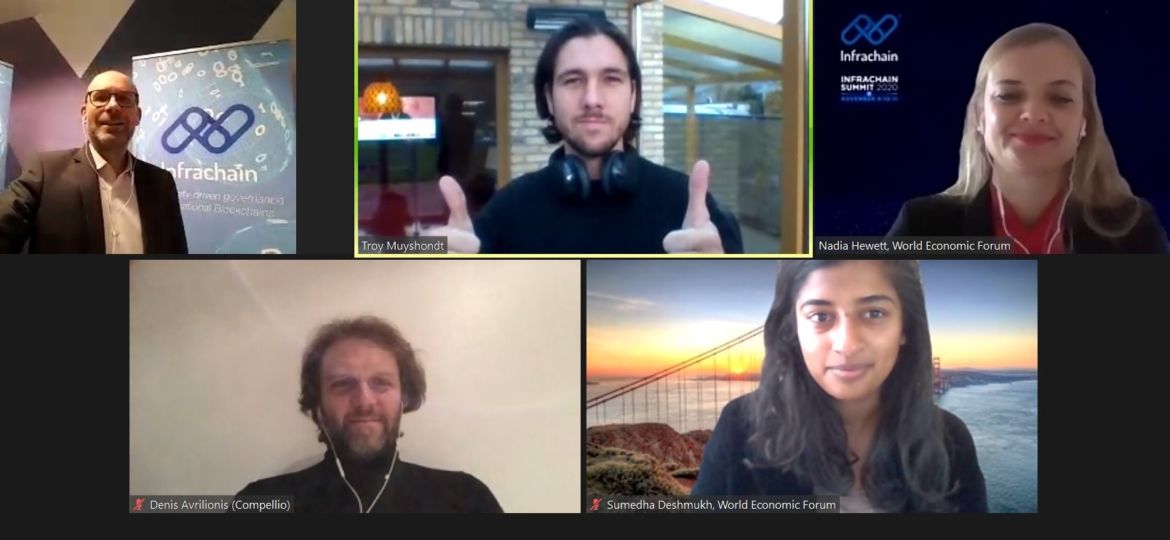Infrachain Summit 2020: Blockchain in supply chain & logistics – Day 3 report
The final day of Infrachain Summit 2020 was opened by Nadia Hewett, Blockchain and Data for Common Purpose Project Lead at the World Economic Forum. The speaker presented the WEF’s Data for Common Purpose Initiative, an initiative to explore and co-design a new flexible data governance model using blockchain and other new technology enablers to allow for unlocking data opportunities – for both the public good and commercial spheres.
The audience was then able to discover a use case in the air cargo business with Lucas Fernandez, Head of Innovation at CHAMP Cargosystems. Fernandez presented the Smart ULD project (ULD = Unit Load Device) which the Luxembourg-based company developed together with SITA. The Smart ULD project aims to provide end-to-end visibility to the air cargo supply chain. It is based on a unique combination of mobile technology, IoT, and Blockchain to increase the quality of the supply chain in aviation by providing advanced tracking, monitoring, and transparency across multiple cargo operations. Scalability was one of the major challenges the project had to face because of the choice of blockchain.
From the air to the sea. In the ‘Blockchain in Supply Chains‘ project, Dockflow and Ledgit have mapped the opportunities and challenges of blockchain technology for Flanders. In the project presented by Dockflow’s CEO Troy Muyshondt, three potential applications for blockchains in supply chains were investigated: certificates, track & trace and e-documents.
 Thomas Campione (PwC Luxembourg) presenting the daily wrap-up at Infrachain Summit 2020
Thomas Campione (PwC Luxembourg) presenting the daily wrap-up at Infrachain Summit 2020
The wine industry is not immune to innovation. Denis Avrilionis, PhD, Founder & CEO at Compellio, presented the last use case of Infrachain Summit 2020: CapChain. CapChain is a joint project by Compellio and Guala Closures combination smart packaging caps with a blockchain middleware solution. Some benefits of the use case are to enable brands to tackle product counterfeiting, drive consumer loyalty programmes, and offer rich product information including data from the vine, certifications and appellations, IoT data, supply chain data, etc.
In the final session of Infrachain Summit 2020, Sumedha Deshmukh, Platform Curator, Blockchain and Digital Currency at the World Economic Forum, shared lessons from 100+ experts in the field of blockchain and supply chains. In this interactive format, the WEF engaged with speakers Denis Avrilionis and Frank Roessig on the opportunities and challenges of blockchain in supply chain and logistics. Both speakers insisted on the need to demonstrate business value when considering the use of blockchain. Frank Roessig added that based on that principle, Telindus sometimes chooses to use blockchain for certain of its characteristics only, be it to use blockchain as a chain of immutable transactions, to rely on the consensus mechanism to create trust or to use it as a distributed database.
Sumedah Deschmukh also presented the WEF’s Blockchain Deployment toolkit which, even if initially designed for supply chain, is also a huge source of information for blockchain deployment in any other sector.
Infrachain’s Vice-chairman, Laurent Kratz, closed the Summit by emphasizing that although Blockchain may be in the trough of disillusion, interesting adoption cases come from the public blockchains and this is a good signal for the adoption of blockchain business applications.
He further underlined that another key feature of blockchains is particularly important in the current situation, namely resilience through decentralized design and heterogeneous architecture.
The Vice-chairman thanked all the participants and people in the audience and looked forward to meet again at Infrachain Summit 2021.


